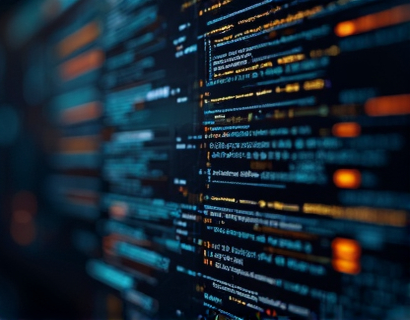AI and Crypto: Revolutionizing Fintech with Intelligent Solutions for the Future
The intersection of artificial intelligence (AI) and cryptocurrency is redefining the landscape of fintech, offering unprecedented opportunities for efficiency, security, and personalization. This transformative fusion is not just a trend but a fundamental shift in how we perceive and interact with digital finance. As tech-savvy crypto enthusiasts and innovators, understanding this synergy is crucial for navigating the future of finance.
The integration of AI into cryptocurrency and blockchain technology has been gradual yet profound. Initially, AI was used to enhance trading strategies through algorithmic trading and market prediction models. However, the potential extends far beyond mere trading. AI is now at the forefront of developing intelligent solutions that can manage, secure, and personalize financial experiences like never before.
Enhancing Trading and Investment Decisions
One of the most immediate impacts of AI in the crypto space is in trading and investment. AI algorithms can process vast amounts of data in real-time, identifying patterns and trends that are imperceptible to human analysts. This capability has given rise to sophisticated trading bots that can execute trades based on predefined criteria, optimizing for profit while minimizing risk. These bots operate 24/7, ensuring that investors can capitalize on market opportunities at any time.
Moreover, AI-driven predictive analytics have become a cornerstone for investment decision-making. By analyzing historical data, market sentiment, and even social media trends, AI models can forecast price movements with increasing accuracy. This not only aids individual traders but also institutional investors who rely on robust analytical tools to make informed decisions. The result is a more efficient market where information asymmetry is reduced, and trading becomes more transparent and fair.
Securing Cryptocurrency Transactions
Security has always been a paramount concern in the crypto world. The decentralized and transparent nature of blockchain technology provides a strong foundation, but AI brings an additional layer of security through advanced threat detection and prevention systems. AI algorithms can monitor blockchain networks in real-time, identifying suspicious activities and potential security breaches before they occur. This proactive approach to security is crucial in a space where the stakes are high and the potential for loss is significant.
Furthermore, AI-powered identity verification and anti-fraud systems are enhancing the security of crypto exchanges and wallet services. By using machine learning to analyze user behavior and transaction patterns, these systems can detect anomalies and prevent fraudulent activities. This not only protects users but also builds trust in the crypto ecosystem, encouraging more widespread adoption.
Personalizing Financial Experiences
The personalization aspect of AI in fintech is perhaps the most transformative. In the traditional financial system, services are often one-size-fits-all, failing to cater to the unique needs and preferences of individual users. AI changes this paradigm by enabling highly personalized financial experiences. For instance, AI-driven financial advisors can analyze a user's financial data, risk tolerance, and investment goals to create customized portfolios and strategies. This level of personalization ensures that users receive tailored advice and solutions that align with their specific circumstances.
Additionally, AI can enhance user interfaces and experiences on crypto platforms. Natural language processing (NLP) and chatbot technology powered by AI can provide users with intuitive and responsive support, answering queries and guiding users through complex processes. This not only improves user satisfaction but also lowers the barrier to entry for new users who might otherwise find the crypto space intimidating.
Optimizing Blockchain Performance
Beyond trading and security, AI is also playing a crucial role in optimizing blockchain performance. Blockchain networks, while revolutionary, face challenges such as scalability and energy consumption. AI can help address these issues by optimizing consensus mechanisms, transaction processing, and network management. For example, AI algorithms can dynamically adjust parameters to balance between security, speed, and energy efficiency, ensuring that blockchain networks operate at optimal levels.
Smart contract optimization is another area where AI shines. By analyzing the code and execution patterns of smart contracts, AI can identify inefficiencies and potential vulnerabilities. This not only enhances the reliability of smart contracts but also reduces the risk of bugs and exploits, which is critical for applications in finance, supply chain, and other industries.
Regulatory Compliance and Risk Management
The regulatory landscape for crypto assets is complex and evolving. AI can significantly aid in navigating this landscape by providing real-time compliance monitoring and risk assessment tools. AI systems can analyze regulatory changes across different jurisdictions, ensuring that crypto businesses stay compliant with local and international laws. This is particularly important as the crypto space continues to grow and attract regulatory scrutiny.
Risk management is another critical area where AI excels. By analyzing vast datasets, AI can identify potential risks and vulnerabilities in financial systems, helping organizations to implement proactive measures. This includes assessing the creditworthiness of users in decentralized finance (DeFi) platforms, reducing the risk of defaults and enhancing the overall stability of the ecosystem.
Future Prospects and Challenges
The future of AI and crypto integration holds immense promise, but it also comes with challenges. One of the primary challenges is the need for standardization and interoperability. As the crypto space grows, with numerous platforms and protocols emerging, ensuring that AI solutions can seamlessly integrate across different systems is crucial. Industry collaboration and the development of open standards will be key to overcoming this challenge.
Another challenge is the ethical use of AI. As AI becomes more pervasive, concerns about bias, transparency, and accountability become more pressing. Ensuring that AI systems are fair, explainable, and aligned with ethical standards is essential for building trust and fostering widespread adoption. This requires a concerted effort from developers, regulators, and the broader community.
Looking ahead, the convergence of AI and crypto is likely to drive innovation in various sectors beyond finance. From supply chain management to healthcare, the intelligent solutions developed for the crypto space can be adapted and applied to solve complex problems across industries. This cross-pollination of technologies will further accelerate the transformation of digital finance and beyond.
In conclusion, the fusion of AI and cryptocurrency is revolutionizing fintech, offering a more efficient, secure, and personalized financial future. As tech-savvy crypto enthusiasts and innovators, embracing this synergy is not just an option but a necessity for staying ahead in the rapidly evolving landscape of digital finance. The journey ahead is exciting, and the potential for innovation is limitless.










































